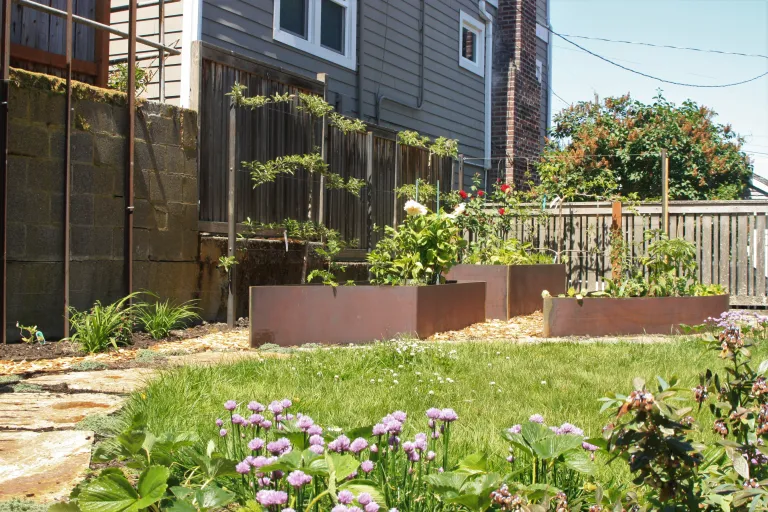
At Rutheo Designs, we create healthy lawns through organic care tailored to Seattle’s climate. By building living soils and avoiding synthetic chemicals, we support lush, low-input turf that thrives naturally. Our services include seasonal aeration, compost topdressing, and even lawn conversions to low-mow or native alternatives.
We focus on making lawns functional, sustainable, and safe for families, pets, and wildlife—while addressing water conservation and runoff issues. Through methods like compost teas, smart irrigation, and eco-friendly grass alternatives, we design care plans that evolve with your landscape’s needs.
We don’t apply synthetic nitrogen, fast-acting fertilizers, or chemical pesticides—because they disrupt soil biology and create dependency on inputs that don’t support long-term lawn health. These quick-fix products may green a lawn temporarily, but they degrade the soil over time and contribute to runoff pollution, especially concerning in a region like Seattle where storm drains flow directly into the Puget Sound. The cumulative impact of herbicides and chemical weed treatments can also damage beneficial microorganisms and contaminate nearby plant beds, pollinator zones, and waterways.
Instead, we focus on practices that restore balance to the lawn’s ecosystem. A lawn built on healthy soil doesn’t need synthetic chemicals to thrive. We prioritize nutrient cycling, water efficiency, and pest prevention strategies rooted in ecology, not dependency. Organic lawn care is not just safer—it’s more sustainable and more self-regulating over time.
A thriving lawn depends on what’s happening below the surface. We feed the soil, not just the grass. That means building rich, aerated soil teeming with microbial life. We amend with screened compost, worm castings, and biochar—each playing a role in supporting beneficial fungi, improving structure, and storing nutrients. Rather than using sterile, chemical-heavy products that suppress life, we support fungal-dominant soil systems that encourage deep, stable root development.
Our dethatching and aeration techniques are designed to preserve rather than disrupt soil biology. We avoid practices that strip the lawn of its protective organic layer. Everything we do, from compost tea applications to mycorrhizal inoculation, is meant to enhance life in the soil, which in turn produces resilient, lush turf without artificial intervention.
Organic lawn care doesn’t chase a hyper-manicured look. Instead, we embrace plant diversity as a strength. A few dandelions or patches of clover can be a sign of healthy soil—not failure. We guide our clients in adjusting expectations to match what a living, chemical-free lawn should look like. A “perfect” lawn under organic care means strong roots, natural disease resistance, and biodiversity—not chemical uniformity.
We also build resilience into the lawn itself through smart watering practices, soil depth improvements, and seed blends adapted for the Pacific Northwest. When roots grow deeper, lawns are less susceptible to drought, compaction, or pests. That kind of resilience is more durable—and more rewarding—than a chemically dependent lawn ever could be.
All of our organic lawn programs begin with understanding the soil. We test for pH, macronutrients, organic matter content, and compaction levels. Depending on the site, we may collect samples ourselves or coordinate with a local lab. Understanding what’s missing (or overloaded) allows us to make precise, ecological recommendations. We read micronutrient levels too, not just the basics—because elements like boron, calcium, and magnesium impact root development and turf color even in small amounts.
Soil conditions vary across Seattle. In some neighborhoods, we’re working with sandy loam; in others, dense clay. Our approach adapts accordingly.
Once we have the data, we work with natural amendments. That might include kelp meal, feather meal, or rock dust to remineralize depleted lawns. We topdress with compost that’s been locally sourced and thoroughly screened, restoring carbon and increasing soil sponge function. For nutrient-depleted lawns, we blend slow-release organic fertilizers into the soil using aeration or hand application, ensuring a steady feed rather than a nutrient spike.
We often incorporate mycorrhizal fungi at the time of seeding or aeration. These fungal networks increase water uptake, reduce stress, and help roots explore deeper soil layers.
Seattle soils often suffer from compaction, especially in lawns with heavy foot traffic or poor drainage. We use core aeration to relieve compaction and open up channels for air, water, and organic matter. In more delicate areas or near established tree roots, we may use liquid aeration—an organic, biodegradable compound that loosens soil without disturbing plant life.
Clay-heavy lawns may benefit from gypsum to improve soil structure without raising pH. Timing and frequency matter—so we build those recommendations into a seasonal plan, not just a one-time treatment.
We mow high. It’s that simple—and that effective. Taller grass promotes deeper roots and shades out weeds. We also return clippings to the lawn, using mulching mowers to cycle nitrogen back into the soil. Sharp blades prevent grass tearing, reducing disease pressure. For clients who prefer to mow themselves, we provide seasonal guidance on cutting height and intervals to match growth patterns and weather conditions.
We take a preventative approach to weeds by improving soil health and turf density. When weeds do show up, we prioritize manual removal, soil pH correction, and increasing competition with thicker grass coverage. For targeted areas, we may use vinegar-based sprays, clove oil solutions, or flame weeding as a last resort—all of which are non-toxic and safe for pets and pollinators.
Each season presents an opportunity to strengthen the lawn holistically. In spring, we apply compost tea, overseed bare patches, and restore microbial activity lost over winter. In summer, we focus on stress prevention—minimizing mowing, conserving water, and reducing compaction. Fall is our window for aeration, overseeding, and preparing the lawn for dormancy. And winter? It’s the time to let the soil rest while we monitor and plan for the next growing cycle.
Watering an organic lawn isn’t about frequency—it’s about strategy. We focus on deep, infrequent watering that encourages turf to send roots downward, creating drought resilience and long-term strength. Watering too often encourages shallow root systems, and in the Pacific Northwest’s relatively temperate climate, that’s a fast way to promote fungal disease and water waste. The best time to irrigate is early morning, when temperatures are low and wind is minimal—reducing evaporation and keeping moisture near the roots where it’s needed most.
Seattle’s rainfall patterns are highly seasonal, with wet winters and increasingly dry summers. We adjust watering plans accordingly, often dialing back or turning systems off entirely in spring and fall. Our organic lawn care programs include seasonal irrigation reviews to make sure your water use stays both effective and responsible.
We often recommend installing smart irrigation systems that take weather, soil type, and plant need into account. These controllers help reduce unnecessary watering and allow us to tailor irrigation zones based on the site’s conditions—whether that’s full sun, dense shade, or slopes that shed water quickly.
We also monitor soil moisture manually or with sensors to avoid runoff or pooling. If water isn’t infiltrating properly, we may recommend soil amendments, aeration, or reconfiguration of the irrigation zones. We calibrate sprinkler heads to prevent overlap or dry zones and make sure that everything from pressure to timing is optimized to support healthy, water-efficient lawns.
Where possible, we integrate passive irrigation systems into the landscape. Capturing rainwater from rooftops into barrels, cisterns, or gravity-fed basins can reduce dependency on municipal water. These systems pair beautifully with organic lawn care, where every input is intentionally selected and naturally filtered.
In certain cases, we explore the use of greywater—lightly used household water from showers or laundry—for lawn irrigation. This requires careful planning, adherence to Washington State regulations, and proper filtration. When implemented responsibly, it allows for greater water savings while still supporting lush, chemical-free turf.

At Rutheo Designs, we are dedicated to transforming your outdoor spaces into beautiful, sustainable landscapes that reflect your vision and the unique character of the Seattle area. Whether you’re looking to enhance your garden with native plants, need expert advice on water-efficient irrigation systems, want to explore custom hardscaping for your outdoor living space, or discuss a comprehensive landscape design, our team is here to assist you every step of the way. We offer services in native plant landscaping, water-efficient irrigation, custom landscape design, and hardscaping solutions tailored to your goals and the local environment. Every project is unique, and we take the time to listen to your needs and offer personalized solutions that align with both your aspirations and Seattle’s natural surroundings.
We invite you to reach out to us to start the conversation about your landscaping needs. You can contact us by email at connect@rutheodesigns.com or give us a call at (360) 844-2989. Whether you have specific questions or are ready to schedule a consultation, we’re eager to help you bring your outdoor vision to life with the care and expertise that Rutheo Designs is known for.